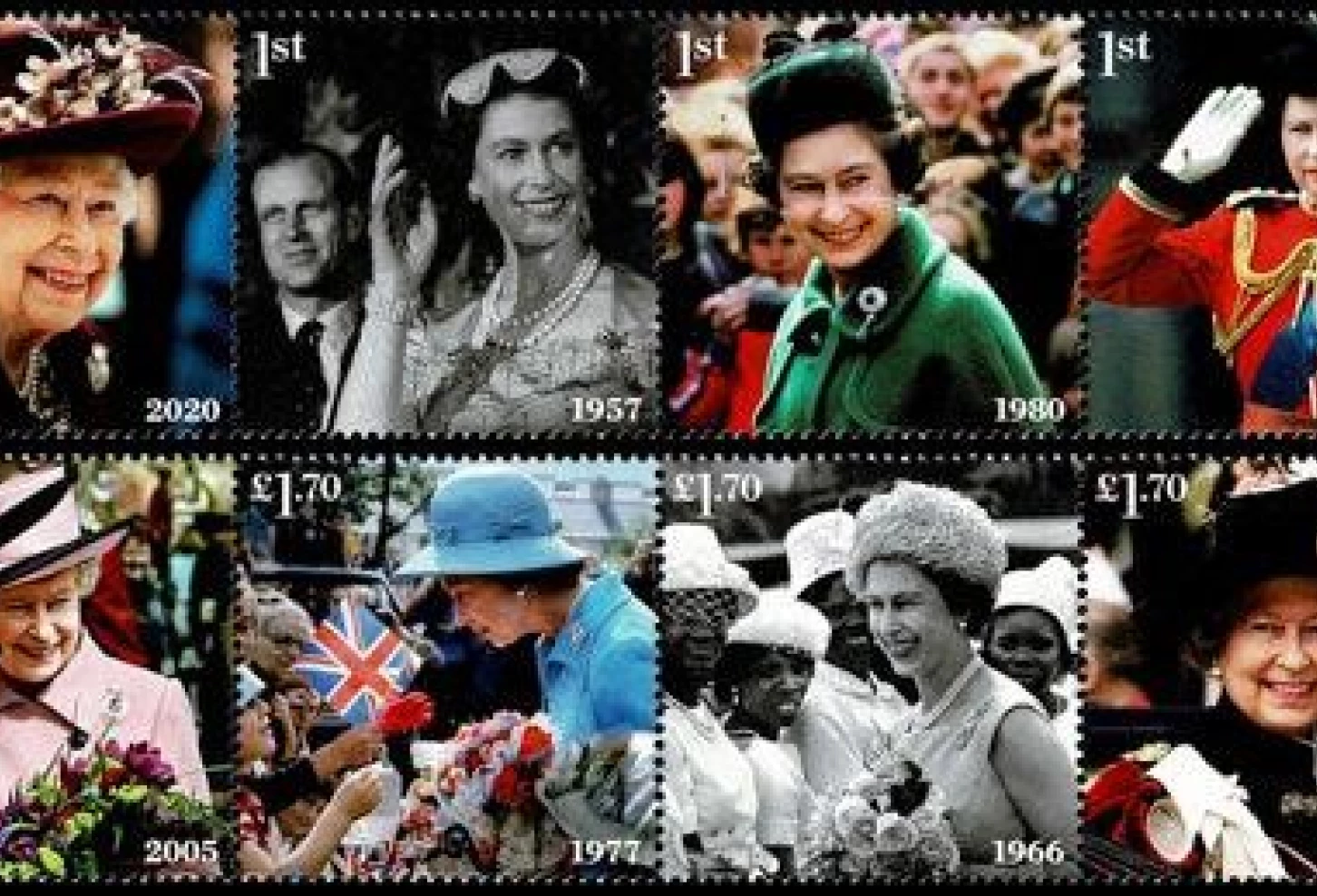Royal Mail stamps, marking in advance (Feb 2022) the Platinum Jubilee of Her Majesty, Queen Elizabeth II (2nd – 5th June 2022).
Today feels, quite simply, unprecedented. Following the death, yesterday, of Her Majesty Queen Elizabeth II, we must all now live without a much-loved Queen whose life and work have, for so long, personified the virtues and values we believe in and epitomised all that we respect or hold dear. Amidst the collective sadness, we each seek our own place to stand. Amongst the communal expressions of grief or gratitude, we must find our own voice. On the first such day, my dual challenge is somehow to speak both for myself and for our College community.
For this day, at least, I find it helpful to turn to British stamps. From ever I had pocket money, I have spent some of it on collecting them, from childhood onwards acquiring at point of issue all those minted during Queen’s Elizabeth’s long reign. In postal terms, stamps are to be taken at face value; in addition, their purpose is also either ordinary or special. Definitives are for each and every day and testify to continuity: they bear only the monarch’s head and usually a value indicator; some are also regionals, incorporating symbols such as a rose, thistle, leek or shamrock, and all definitives. Commemoratives, on the other hand, introduce an element of the unexpected, adding their depictions of nationally or internationally significant anniversaries or events, people and achievements: over seventy years of bearing the Queen’s head, they have helped tell the unfolding story of an astonishing reign, from her Coronation to her last and greatest Jubilee.
In my eyes, at least, these stamps symbolise both the commonplace and the extraordinary. Together they testify silently yet eloquently to something definitive, the dependable constancy that our gracious Queen embodied, and to something we should commemorate and celebrate, the dutiful service she gave throughout her long and productive life. Only two regal portraits or heads – Queen Elizabeth’s, or that of her great grandmother, Queen Victoria – have emblazoned our stamps for one hundred and thirty-four of the years since 1840, when Rowland Hill’s penny postage inaugurated stamps for the world’s letters. With their invention in Britain as justification, only British stamps make no mention of their country of origin: the sovereign’s head is enough. Victoria’s adorned the stamps of her realms in the age of empire. A half-century later, Elizabeth’s head replaced her father’s even as Britain’s place in the world was evolving and the Commonwealth of nations taking shape. In a world changing more rapidly even than in the Victorian age, travel to the hundred or so countries she has visited, or communication and technology, have made Queen Elizabeth II the planet’s best-known and most instantly recognisable person.
Almost as long as the history of our stamps is the story of our College, which also runs from Victoria to Elizabeth. Founded as the Presbyterian College in 1853, during Queen Victoria’s reign, under Queen Elizabeth it amalgamated with another Victorian institution, Magee College, in 1978 to form Union Theological College. As for the Presbyterian Theological Faculty, Ireland, it is by virtue of the 1881 Royal Charter, granted by Queen Victoria, and of the 2021 Supplemental Charter, granted by Queen Elizabeth, that PTFI degrees are awarded.
Over the years, the essential purposes of constitutional monarchy may have varied little. Yet it was in the unpredictable ebb and flow of her life and times that our late Queen seized opportunities, on Christmas Day and every day, to speak of following Jesus or to live out her dedication to Christ, his Church and her role in the humble and devoted example she set us all. Through the years, our College’s educational objectives have also remained relatively stable. Yet change and challenge also characterise the circumstances in which the College pursues its ongoing mission or our ministers in training and our theology students go on to bear witness, serve the community and make a difference. Looking back, there is so much to admire in Queen’s Elizabeth’s steadfastness in the daily discharge of her responsibilities and so much to inspire in the undaunted and adaptable way she dealt with the unexpected. We give heartfelt thanks to God for a long life well lived.
Royal Mail Stamps commemorating the Investiture of Charles, Prince of Wales, on 1st July 1969 at Caernarfon Castle.

Some of the first stamps I bought commemorated the July 1969 investiture of Prince Charles, as Prince of Wales, who in September 2022 has now become His Majesty King Charles III. In light of the King’s September accession, the sovereign’s head will doubtless soon change on future stamps, to reflect a new day and a new reign. This September is also a new beginning for our College, as students join us for a new academic or ministerial programme or return for a fresh academic year. As we begin interceding for King Charles and praying that God’s choicest gifts be bestowed on him, as they were upon his mother, we also rely on the God of grace to equip us for making a reality the College’s vision and fulfilling its mission, to the glory of Christ the King of kings and Lord of lords.
Gordon Campbell.

